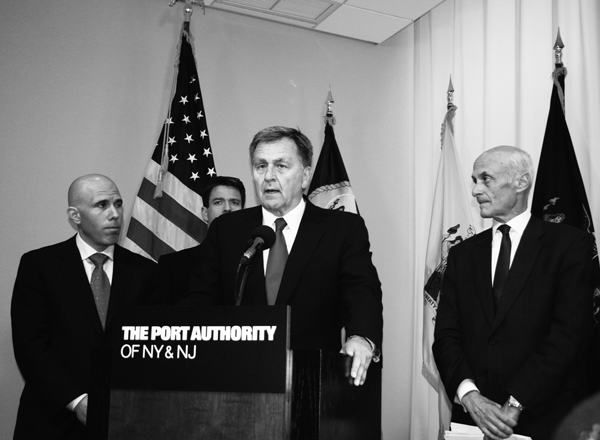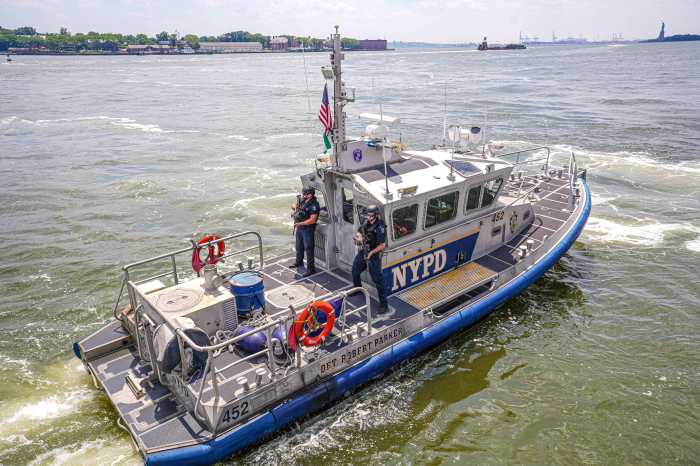[media-credit name=”Downtown Express photo by Aline Reynolds ” align=”aligncenter” width=”600″] [/media-credit]
[/media-credit]
BY ALINE REYNOLDS | In the wake of a scathing financial audit of the agency released in February, The Port Authority of New York and New Jersey, is gearing up for a massive overhaul of its operations that entail cutting back on employee benefits and centralizing its security force.
The bi-state agency’s Board of Commissioners voted in favor of the sweeping reforms at its monthly board meeting last Thurs., March 29. The changes, purported to generate more than $14 million in savings this year and upwards of $26 million in 2013, will require Port Authority employees to pay for part of their health insurance, eliminate their bonuses and other add-on compensations and trim their vacations.
While he doesn’t foresee layoffs, Port Authority Executive Director Patrick Foye does expect some Port Authority personnel to retire early due to the cutbacks.
“This is a painful exercise,” said Foye. “It does constitute an actual pay cut for many people here at the Port Authority.”
The reforms mark a “critical juncture” in the life of the Port Authority, which aims to adopt a culture of meritocracy rather than one of tenure, according to Board of Commissioners Chairman David Samson.
“It’s a major course of correction for the Port Authority,” said Samson. “Ongoing review has led us to conclude that [employee] compensation and benefits… have ballooned out of proportion.”
The Port Authority also has plans to create a centralized, free-standing security department by late September, as recommended by former U.S. Homeland Security Secretary Michael Chertoff, who the agency hired last year to conduct a top-to-bottom study of its security operations. At a press conference following last week’s Board of Commissioners meeting, Samson called Chertoff “the person who knows more about security than anyone else on the planet.”
The agency is launching a nationwide search for a chief security officer who will be tasked with overseeing security at its various sites and facilities.
The initiative will involve “a fundamental transformation” of the agency’s bifurcated security structure that dates back to the 1950s, two decades prior to the opening of the former W.T.C. At the time, security wasn’t a top priority of the agency, since terrorism and other contemporary threats didn’t exist at the time, according to Chertoff.
“It’s easy to understand this. Sixty years ago, we were mainly worried about Soviet missiles,” said Chertoff. “Sixty years later, security has a much, much more complicated set of challenges.”
The proposed consolidations of security weren’t triggered by a new terrorist threat, Chertoff noted.
“When coming upon the 10th anniversary of September 11th, I think the Board of Commissioners widely decided to step back and take a look at security from a holistic standpoint,” said Chertoff. “It was a [decision to] take a calm look at what has worked and what hasn’t worked.”
It wasn’t immediately clear how exactly the new security department would interface with the New York Police Department in implementing the NYPD counterterrorism bureau’s safety plan for the W.T.C., though Foye maintained that the site would be jointly manned by the Port Authority Police and the NYPD.
Asked about the initiative, Foye stressed that the objectives of guaranteeing safety at the site and keeping Downtown accessible to the local community must be balanced.
“We share the concerns of Downtown, because we’re going to be a large landowner and we’re going to have our own office there, so we’re going to have thousands of Port Authority people at the site,” said Foye.
Maintaining the W.T.C. as the safest office, transportation and retail complex in the world, Foye added, is “a priority of the organization… that we’re well on the way to attaining.”
Foye also spoke to the additional financial controls the Port Authority has adopted since he took the helm last fall, including a zero-tolerance policy on scope changes to W.T.C. construction involving third parties.
Foye forcefully denied allegations that the agency is behind on payments to W.T.C. construction contractors and subcontractors. During last week’s meeting, the Board of Commissioners authorized $15 million covering their invoices through February.
“I didn’t hear any contractors at today’s public meeting complain about not being paid,” said Foye.
Addressing reporters’ questions about the standoff between the Port Authority and the National Sept. 11 Memorial Foundation, Foye reiterated that recent discussions with the Mayor’s office and the Foundation have been “fruitful,” and that the Board of Commissioners discussed the matter during its closed-door executive session at last week’s meeting. In the meantime, construction of the National Sept. 11 Memorial Museum continues at a reduced rate, according to Port Authority Spokesperson Steve Coleman.
“We’ll come back to you with a specific announcement at the right time,” Foye told the reporters.

























